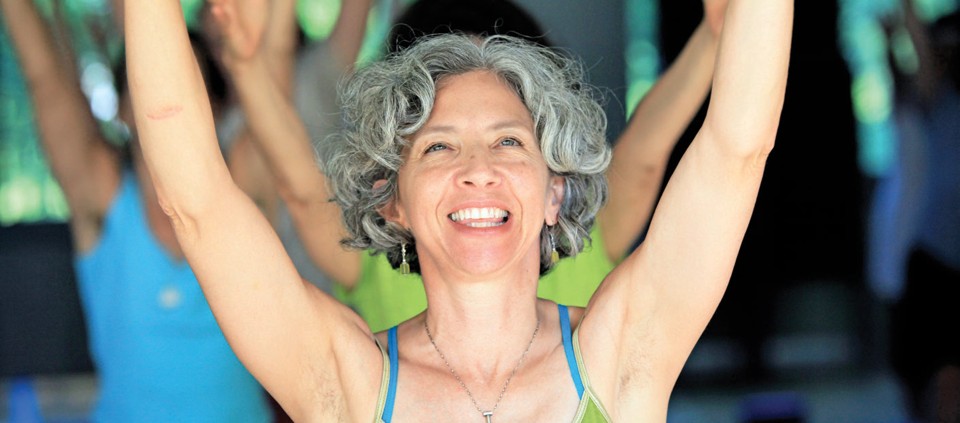Yoga for Healthy Aging

In this excerpt from their book Yoga for Healthy Aging: A Guide to Lifelong Well-Being, Baxter Bell, MD, and Nina Zolotow address how yoga can support brain and nervous system health. Get a 30 percent discount on the book at the Shambhala website.
Our colleague Dr. Rammohan Rao is both a neuroscientist who studies Alzheimer’s disease and a yoga teacher. Ram has a daily asana practice, which he varies as much as possible. He says he makes sure to include inverted poses because they calm the chattering of the mind and also “put our body in a position to take advantage of gravity to assist in the blood flow back toward the heart and head.” (Studies have shown that aging is associated with reduced cerebral blood flow that can have deleterious health effects.) He also meditates to settle his unruly mind, practices pranayama to reduce stress, and uses the wisdom of yoga to cultivate contentment and maintain his mental health. He says:
I incorporate yoga as part of my daily mental exercise regime. Yoga to me is not just about asanas but all forms of the discipline that bring the body-mind-breath in tune. I sincerely feel that my yoga practice is keeping me mentally agile as well as physically fit.
About Your Brain and Nervous System
In the classic Steve Martin movie, The Man with Two Brains, Dr. Michael Hfuhruhurr visits the lab of mad scientist Dr. Necessiter, who has a collection of brains stored in glass jars, and falls in love with brain 21, Anne Uumellmahaye, with whom he communicates telepathically. Well, yes, we loved that movie, but it’s a perfect example of how not to think about the brain.
For some reason, most of us do tend to think about the brain the way it’s portrayed in that movie—as a separate entity from the rest of the body where all cognition and emotion takes place (while the body does the work of keeping us alive).
But that’s not really how it works. First of all, your brain plays an absolutely essential role in keeping your body alive. Through a network of nerves, your brain is connected to all of the other organs, structures, and systems of your body, and it actually keeps you breathing, keeps your heart beating, and coordinates all of the other functions, such as those of the digestive and immune systems that are keeping you healthy and active.
As for the thinking and feeling parts, our senses—sight, hearing, smell, taste, and touch (which is present in our entire skin)—are an essential part of how our brain interacts with and understands the world around us. So maybe your entire body is part of your brain! For example, the sensation you experience on the bottoms of your feet as you walk on an uneven surface is information your brain needs to keep you from falling.
This is why when we discuss yoga for brain health, it doesn’t make sense to address the single organ—and its cognitive abilities—on its own. Instead, we address your brain along with the entire nervous system that your brain uses to communicate with the rest of your body. Because your brain is a part of your body—just like your heart or liver—keeping your body itself healthy is as vital for maintaining brain health as is staying mentally and socially active.
How Yoga Helps
Because your brain is connected to all the other organs, structures, and systems of your body, what we do to keep our other organs and systems healthy has an effect on our brains, and we shouldn’t be surprised by that. But we are surprised! We tend to think we can keep the brain healthy just by feeding it new information and experiences, such as by learning new languages, playing music, and doing crossword puzzles. But physical exercise could be as or more important than mental exercise. In fact, a recent study that looked at both leg strength and cognitive ability in twins as they aged showed that those who maintained better leg strength as a result of exercising had better memory and other cognitive functions than their nonexercising twin.
Because yoga includes active exercise, resting poses, stress management practices, and equanimity practices that help maintain overall physical and spiritual health, as well as ongoing opportunities for learning, it’s surprisingly effective for brain health.
Find out more about upcoming programs with Baxter Bell at Kripalu.
Excerpted with permission from Yoga for Healthy Aging: A Guide to Lifelong Well-Being, © 2017, by Baxter Bell, MD, and Nina Zolotow. Reprinted by arrangement with Shambhala Publications, Inc. Boulder, CO.
Baxter Bell, MD, C-IAYT, YACEP, is coauthor of the book Yoga for Healthy Aging and a leading voice internationally for the benefits of yoga as we age.
Full Bio and Programs